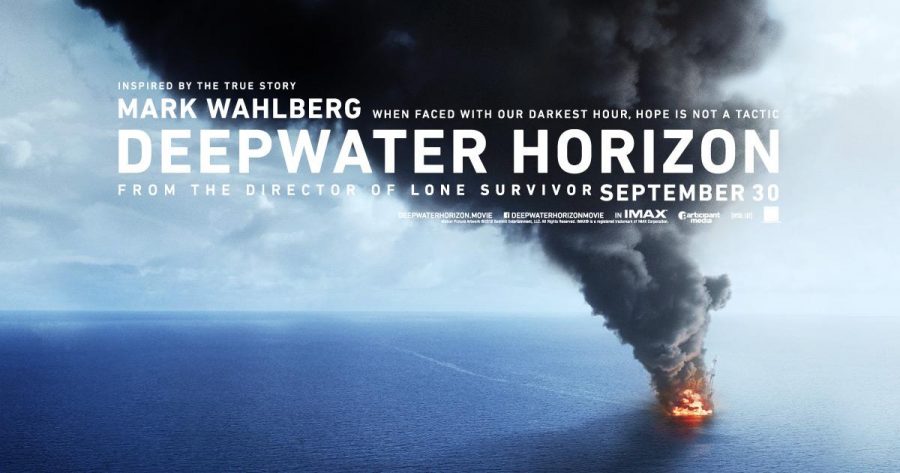Anchors (Out of Four):

When the BP oil rig Deepwater Horizon blew out in the spring of 2010, the majority of that summer’s news coverage focused not on the destruction of the rig itself, but on the continuously gushing pipeline it left in its wake. I clearly remember watching BP executives testify to the U.S. Congress regarding their efforts to control the flow and the responsibility they took for the disaster, but again I can’t seem to remember the testimony of the rig’s crew. I recall when BP claimed to have finally closed the well, and the oil cleanup efforts that would preoccupy Gulf states for months after, but I never recall hearing of a resolution for those workers, funerals for the ones who lost their lives or payments to their families by British Petroleum.
Based off the New York Times article “Deepwater Horizon’s Final Hours,” director Peter Berg’s (“Lone Survivor,” “Friday Night Lights”) newest film takes us to this other side of the greatest American environmental tragedy of the 21st century. It accomplishes a lot in its fairly short runtime – I teared up as family members tried to find their husbands and sons who worked on the rig, I learned fair amount (considering my starting point) about what caused the blow out in the first place, and I got angry at BP executives (represented here by John Malkovich, who gives his character Donald Vidrine a Louisiana accent as slippery as the crude oil covering his helmet).
“Deepwater Horizon” is nothing if not immersive. The rig itself is presented in a way that feels massive in the eyes of the viewer. It’s a perfect set piece, a floating city on the water with a lived-in feel and enough idiosyncrasies to very quickly telegraph that something bad is about to happen.
The Louisiana drawl prevalent to some extent in almost every character on the rig draws you in further and provides for some amusing interactions. Words like “negative pressure test,” “drilling mud,” and “kill line,” and other drilling terminology are heavily used throughout the film so that the viewer doesn’t feel like they were invited to a movie, but are rather observing business as usual on the rig.
In this case, that business goes terribly wrong. “Deepwater Horizon” does everything a well-made disaster movie needs to do – a slow build up with obvious foreshadowing and the eventual pay off, a spectacular scene of destruction that locks your eyes to the screen. In this case, that build-up of pressure couldn’t be more literal. Also in this case, the disaster holds a certain greater significance. We know that every poor decision made by the villainous BP executives in the film was a real one. We know the same for every life lost on the rig as well. Although I’m not usually a big fan of slideshows and exposition after films, “Deepwater Horizon” hammers the tragedy of this event home with just such an epilogue.
It’s almost ironic that oil causes the disaster in this movie. For all the dirt and grit that fill the Deepwater Horizon before it sinks, the filmmaking is clean and pristine. We care just enough about the characters to worry about them. The film is technically flawless. Mark Wahlberg (“Ted,” “Shooter”) and Kurt Russell (“The Thing,” “The Hateful Eight”) fit the blue collar hero mold well, and Dylan O’Brien (“Maze Runner”) gives a great performance as Caleb Holloway, the youngest Horizon crewmember. The pieces are all there, and it’s a solid film.
That being said, it doesn’t stand out. Disaster movies are often a campy affair, with some of them bordering on schlock, and that’s usually a good thing. “Deepwater Horizon” can’t be that way because of the seriousness of the subject matter, and so it needs to straddle the mold of a serious biographical drama and a suspenseful thriller. This isn’t a bad thing. I think the movie pays respect to the rig’s crew and places blame where it believes necessary. But I also think it can only go so far living in two different worlds.
Verdict: Anchor Down (but not too close to the oil rig). No matter how you categorize it, this movie is well made and suspenseful. You don’t need to see it, but it should be at the top of your “list of movies that I might have forgotten about in theaters but should check out a few months from now.”











